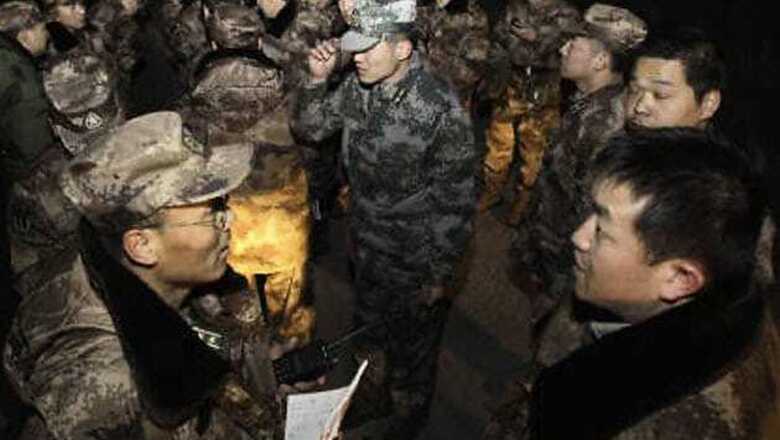
views
Yushu, China: The death toll from an earthquake in China's remote and mountainous Yushu country has soared to 617, even as convoys of trucks carried in supplies and tents on Thursday for survivors braving the cold.
The death toll is expected to rise further, in freezing temperatures that leave little hope for those still trapped under the rubble of homes, schools and monasteries in the ruined county seat, Jiegu, known in Tibetan as Gyegu or Jyeku.
Nearly 10,000 people have been injured, almost 1,000 of them severely, while hundreds are still unaccounted for after the quake on Wednesday, the official Xinhua news agency said, citing a spokesman with the rescue headquarters in the ethnically Tibetan town.
Buses carrying rescue workers and trucks filled with food and medicine rumbled all night through sleet, sandstorms and fierce icy winds along the 1,000 km-long (620-mile) highway separating Yushu from the Qinghai provincial capital, Xining.
Local officials have spoken of the urgent need for medicine and shelter in Yushu, whose 100,000 people are concentrated near the county seat.
"The biggest problem now is that we lack tents, we lack medical equipment, medicine and medical workers," Zhuohuaxia, a local spokesman, told Xinhua on Wednesday.
Cracks appeared in a dam near the town of Gyegu, Xinhua has said, adding that repair workers were trying to stabilise the structure and prevent it from bursting and flooding the town.
Survivors slept beneath quilts collected from the cinderblocks and bricks of their former homes, or set up tents on a flat area just outside town.
Some spent the night in cars for warmth, state TV said.
The main 6.9 quake was centred in the mountains that divide Qinghai province from the Tibet Autonomous Region. The Tibetan plateau is regularly shaken by earthquakes, though casualties are usually minimal because so few people live there.
MEMORIES OF SICHUAN
For many Chinese, images from Yushu recall the devastating May 2008 earthquake in Sichuan province, which killed 80,000.
Volunteers and donors traded information on Twitter accounts, while Tibetans and Chinese living in Beijing organised an impromptu fund-raiser near the Chinese capital's largest Tibetan Buddhist temple.
In the Sichuan quake, the widespread collapse of school buildings when many other surrounding buildings remained standing, caused anger and accusations of corruption.
In the Yushu quake, 66 students and 10 teachers were confirmed dead at three schools, including a collapsed vocational school, Xinhua said.
Experience from that rescue effort was evident in the speedy deployment of material after the quake.
President Hu Jintao and Premier Wen Jiabao have called for all-out efforts in rescue attempts, and sent Vice-Premier Hui Liangyu to Qinghai to oversee relief work.
Exiled Tibetan spiritual leader the Dalai Lama, who was born in Qinghai, said in a statement he was praying for the victims.
"It is my hope that all possible assistance and relief work will reach these people. I am also exploring how I, too, can contribute to these efforts," said the Nobel Peace Prize winner, who Beijing accuses of promoting Tibetan independence but who says he simply wants meaningful autonomy for his homeland.
Some bridges and roads around Yushu have cracked or been cut off completely, which could complicate rescue efforts, state media said. The airport is open, but the 50-km road connecting it to the county seat was heavily damaged.
"The extreme poverty of the region should be a reminder of why many in China do not recognise the caricature of the country as an economic superpower that is often painted overseas," said London-based Capital Economics said in an emailed statement.




















Comments
0 comment